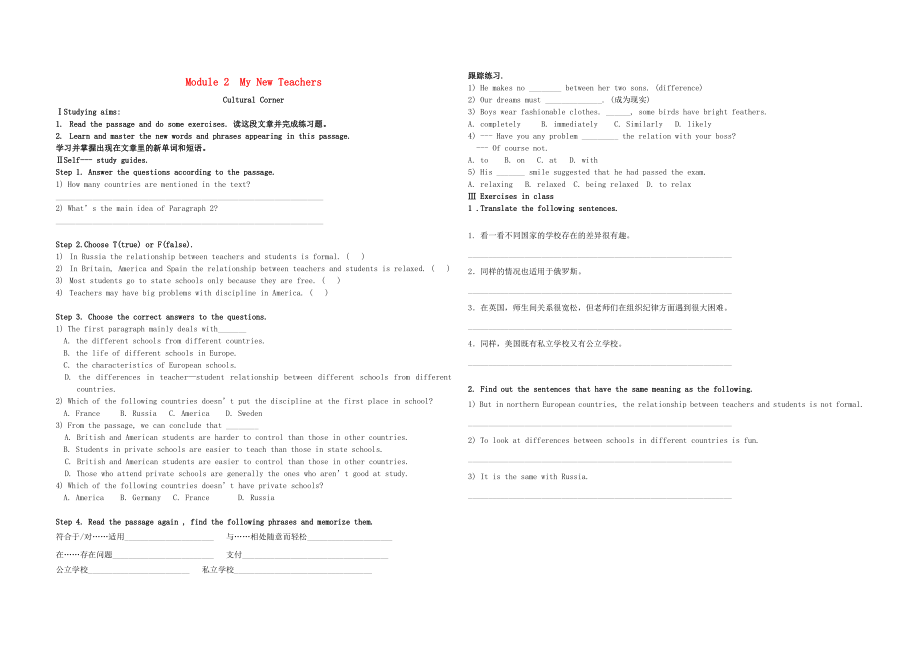《2015-2016學(xué)年高中英語(yǔ) Module2 My new teachers文化廣角學(xué)案(無答案)外研版必修1》由會(huì)員分享,可在線閱讀��,更多相關(guān)《2015-2016學(xué)年高中英語(yǔ) Module2 My new teachers文化廣角學(xué)案(無答案)外研版必修1(1頁(yè)珍藏版)》請(qǐng)?jiān)谘b配圖網(wǎng)上搜索�����。
1����、Module 2 My New Teachers
Cultural Corner
ⅠStudying aims:
1. Read the passage and do some exercises. 讀這段文章并完成練習(xí)題。
2. Learn and master the new words and phrases appearing in this passage.
學(xué)習(xí)并掌握出現(xiàn)在文章里的新單詞和短語(yǔ)���。
ⅡSelf--- study guides.
Step 1. Answer the questions according to the passage.
1) How
2���、many countries are mentioned in the text?
__________________________________________________________________
2) What’s the main idea of Paragraph 2?
__________________________________________________________________
Step 2.Choose T(true) or F(false).
1) In Russia the relationship between te
3、achers and students is formal. ( )
2) In Britain, America and Spain the relationship between teachers and students is relaxed. ( )
3) Most students go to state schools only because they are free. ( )
4) Teachers may have big problems with discipline in America. ( )
Step 3. Choose the c
4、orrect answers to the questions.
1) The first paragraph mainly deals with_______
A. the different schools from different countries.
B. the life of different schools in Europe.
C. the characteristics of European schools.
D. the differences in teacher—student relationship between different school
5��、s from different countries.
2) Which of the following countries doesn’t put the discipline at the first place in school?
A. France B. Russia C. America D. Sweden
3) From the passage, we can conclude that ________
A. British and American students are harder to control than those in other
6�、 countries.
B. Students in private schools are easier to teach than those in state schools.
C. British and American students are easier to control than those in other countries.
D. Those who attend private schools are generally the ones who aren’t good at study.
4) Which of the following countri
7、es doesn’t have private schools?
A. America B. Germany C. France D. Russia
Step 4. Read the passage again , find the following phrases and memorize them.
符合于/對(duì)……適用______________________ 與……相處隨意而輕松_____________________
在……存在問題_________________________ 支付__________________________
8��、__________
公立學(xué)校_________________________ 私立學(xué)校__________________________________
跟蹤練習(xí).
1) He makes no ________ between her two sons. (difference)
2) Our dreams must ______________. (成為現(xiàn)實(shí))
3) Boys wear fashionable clothes. ______, some birds have bright feathers.
A. completely?? B. immediatel
9��、y ? C. Similarly? D. likely
4) --- Have you any problem _________ the relation with your boss?
--- Of course not.
A. to B. on C. at D. with
5) His _______ smile suggested that he had passed the exam.
A. relaxing B. relaxed C. being relaxed D. to relax
Ⅲ Exercises in class
1 .Tra
10����、nslate the following sentences.
1. 看一看不同國(guó)家的學(xué)校存在的差異很有趣。
_________________________________________________________________
2.同樣的情況也適用于俄羅斯����。
_________________________________________________________________
3.在英國(guó),師生間關(guān)系很寬松��,但老師們?cè)诮M織紀(jì)律方面遇到很大困難��。
______________________________________________________
11��、___________
4.同樣�,美國(guó)既有私立學(xué)校又有公立學(xué)校。
_________________________________________________________________
2. Find out the sentences that have the same meaning as the following.
1) But in northern European countries, the relationship between teachers and students is not formal.
_________________________________________________________________
2) To look at differences between schools in different countries is fun.
_________________________________________________________________
3) It is the same with Russia.
_________________________________________________________________
 2015-2016學(xué)年高中英語(yǔ) Module2 My new teachers文化廣角學(xué)案(無答案)外研版必修1
2015-2016學(xué)年高中英語(yǔ) Module2 My new teachers文化廣角學(xué)案(無答案)外研版必修1
